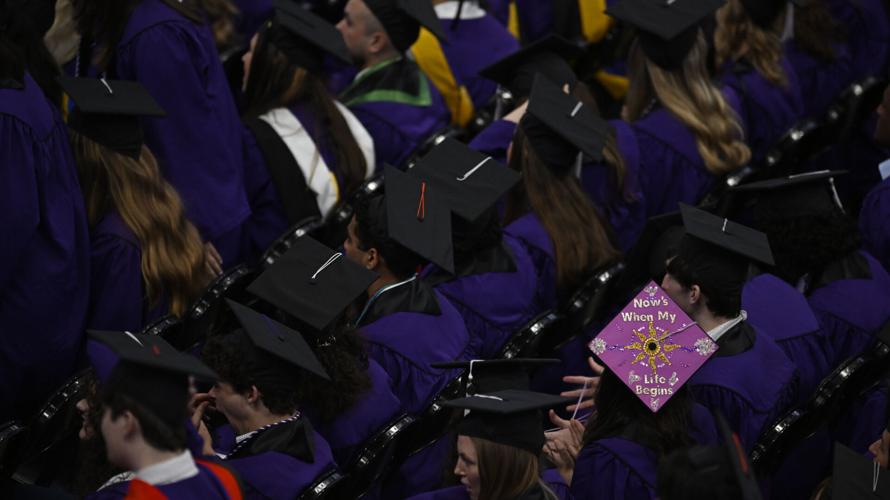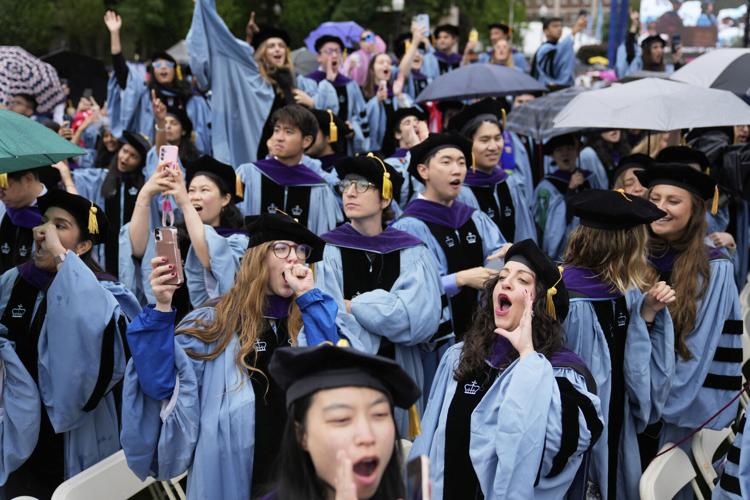WASHINGTON — While completing a master's degree in data analysis, Palwasha Zahid moved from Dallas to a town near . The location made it easy to visit the campuses of tech stalwarts including Google, Apple and .
Zahid, 25, completed her studies in December, but so far she hasn't found a job in that surrounds her.
"It stings a little bit," she said. "I never imagined it would be this difficult just to get a foot in the door."
Young people graduating from and summer face one of the toughest job markets in more than a decade. The unemployment rate for degree holders ages 22 to 27 in a dozen years, excluding the COVID-19 pandemic. Joblessness among that group is now higher than the overall unemployment rate, and the gap is larger than it has been in more than three decades.
People are also reading…
The rise in unemployment worried many economists as well as officials at the Federal Reserve because it could be an early sign of trouble for the economy. It suggests businesses are because of uncertainty stemming from the Trump administration's tariff increases, which could slow growth.
"Young people are bearing the brunt of a lot of economic uncertainty," said Brad Hersbein, senior economist at labor-focused think tank Upjohn Institute. "The people that you often are most hesitant in hiring when economic conditions are uncertain are entry-level positions."
The growth of may play an additional role by eating away at positions for beginners in white-collar professions such as information technology, finance and law.
Higher unemployment for younger graduates also renewed concerns about the . More workers than ever have a four-year degree, which makes it less of a distinguishing factor in job applications. Murat Tasci, an economist at JPMorgan, calculates that 45% of workers have a four-year degree, up from 26% in 1992.
While the difficulty of finding work demoralizes young people like Zahid, most economists argue that holding a college degree still offers . Graduates earn higher pay and experience much less unemployment over their lifetimes.
The overall U.S. unemployment rate is a still-low 4.2%, and the government's monthly jobs reports show the economy is . However, the additional jobs are concentrated in health care, government, and restaurants and hotels. Job gains in professions with more — such as information technology, legal services and accounting — languished in the past 12 months.
The unemployment rate stayed low mostly because layoffs are still relatively rare. The actual hiring rate — new hires as a percentage of all jobs — fell to 2014 levels, when the unemployment rate was much higher, at 6.2%. Economists call it a no-hire, no-fire economy.
For college graduates 22 to 27 years old, the — the highest, excluding the pandemic, since 2012 and far above the nationwide rate.
Lexie Lindo, 23, saw how reluctant companies were to hire while applying for more than 100 jobs last summer and fall after graduating from Clark Atlanta University with a business degree and 3.8 GPA. She had several summer internships in fields such as logistics and real estate while getting her degree, but no offer came.
"Nobody was taking interviews or responding back to any applications that I filled out," Lindo, who is from Auburn, Georgia, said.
She returned to Clark for a master's program in supply chain studies and has an internship this summer at a Fortune 500 company in Austin, Texas. She's hopeful it will lead to a job next year.
Artificial intelligence could be a culprit, particularly in IT. Matthew Martin, senior U.S. economist at Oxford Economics, calculated that employment for college graduates 28 and above in computer science and mathematical occupations increased a slight 0.8% since 2022. For those ages 22 to 27, it fell 8%.
Company announcements further fueled concerns.
Tobi Lutke, CEO of online commerce software company Shopify, said in an April memo that before requesting new hires, "teams must demonstrate why they cannot get what they want done using AI."
Amazon CEO Andy Jassy recently said over the next few years.
Zahid worries that AI is hurting her chances. She remembers seeing big billboard ads for AI at the San Francisco airport that asked, "Why hire a human when you could use AI?"
Still, many economists argue that blaming AI is premature. Most companies are in the early stages of adopting the technology.
Professional networking platform LinkedIn categorized occupations based on their exposure to AI and did not see big hiring differences between professions where AI was more prevalent and where it wasn't, said Kory Kantenga, the firm's head of economics for the Americas.
"We don't see any broad-based evidence that AI is having a disproportionate impact in the labor market or even a disproportionate impact on younger workers versus older workers," he said.
He added that the Federal Reserve's interest rate hikes also slowed hiring in tech.























